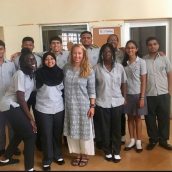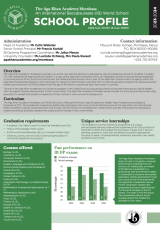Shad Bherani: Making the connection between classroom and career
In his final year of the Diploma Programme at the Aga Khan Academy Mombasa, Shad Bherani is ambitious, curious, and driven to become an engineer – or, as he describes himself, “simply one of 7.6 billion people who is passionate to pursue his career.”
Sticking to his motto that “opportunity only comes once,” Shad opted to use his summer vacation last year to bridge the gap between his classwork in the sciences and his calling in mechanical engineering. “I just thought not to sit back at home – to do something for me, for my career,” he says. And so, at home in Karachi, he inquired at the Aga Khan University (AKU) if they might consider taking him, a keen and talented International Baccalaureate (IB) student, as a summer intern through the Academies internship programme.They fortunately agreed – and the placement, Shad’s first professional role, turned out to be a thrilling and fulfilling hands-on learning experience. He spent several weeks working closely with engineers and technicians in the AKU Hospital’s Mechanical, Electrical and Plumbing department. With their supervision and support, Shad learned how to operate the Building Management System, which runs the air conditioning across campus, including filtering air and controlling the temperature of every air conditioning unit. He also came to understand the ins and outs of the campus’s primary, secondary, and tertiary or emergency power sources, which are essential for critical wards in the hospital.
By helping to repair various machines and air conditioning units, assisting with reports and handling secondary power unit operations, Shad applied the theories he had learned in his math, physics and chemistry classes at the Academy to the complex machinery and inner workings of the hospital and university campus.
For Shad, that was the most memorable outcome of his internship: the reward of having his classwork and textbooks come to life in real-world applications. His strongest subject at school is physics, and he gained a new appreciation for the course, as it is arguably “the most important component in mechanical engineering.” Now, he enjoys discussing the class topics and their real-world relevance in more depth with his teacher.
It was also a joy for Shad to find that he could handle the chemical formulas used in filtering atmospheric air, and could understand the mechanics of supply and exhaust fans, chillers and boilers. Shad found that he could confidently approach new, unfamiliar tasks and challenges by combining his previously acquired knowledge with the skills he was developing in practice at the internship.
In addition to applying and developing his technical knowledge and skills, Shad also gained insight into the workforce: “I saw how the ‘official’ world works – the life of a student is different from that of a person who is working!” he reflects. He points out that in the working world, everything is on time, and one of the major transferable skills he has gained from the Academy is the ability to manage his time and meet deadlines while balancing a heavy workload.
And balance, for Shad, is key: “I also got the opportunity to see the other side of engineers working in control rooms – by getting involved in jokes during lunchtime”, he recalls, which he welcomed as a way to relieve the stress of the 10-hour work days. Shad also maintains balance in his school life: despite his continuous deadlines for assignments and university applications, Shad values spending time in activities and service. “The Aga Khan Academy is known for its holistic development…in our enrichment, we do service for other people; we go on adventures, we serve our community.”In this spirit of collaboration and service, Shad aspires to use his education and career as an engineer to give back and to serve his country and its people, by assisting in Pakistan’s development through technology.
Shad’s inspiring internship renewed his motivation to keep working towards those goals. “Before, I didn’t actually know what will happen in my career,” he says. “But now, I know how I’ll be working, after my undergrad, if I pursue that career.” As he looks ahead and plans for that academic and professional journey, he is keeping his options open: “I’ve already applied to universities worldwide.”
The internship at AKU exceeded all Shad’s expectations and instilled a stronger sense of self-confidence. He especially appreciated being encouraged to undertake tasks normally handled by engineers, and to be an integral part of the team. “My supervisor was impressed with me,” he says proudly. “He told me that he can see an engineer in me.”
By Natasha Pirani






